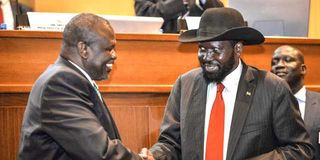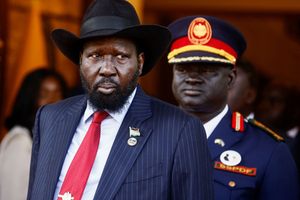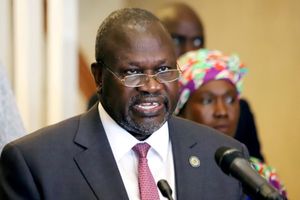
South Sudan President Salva Kiir (right) and Riek Machar.
Lt-Gen (Rtd) Lazarus Sumbeiywo may be one of Kenya’s best exports at mediation. Back in 2005, he helped begin the journey to birth Africa’s youngest nation in South Sudan in 2011.
So when President William Ruto named him the mediator for hold-out groups and the government in Juba, it looked like a duck in water.
But two months into the journey, even his head may be spinning. Here is a group of ‘generals’ and ‘commanders-in-chief’ supposed to talk and iron out their differences.
These are the groups that had steered clear of past peace deals. Now they want in.
Whether they sign a long-term deal is debatable but at least he had, by last week, secured commitments from the armed groups to cease fire, commit to rebuilding South Sudan, respect diversity of opinion and commit to use peaceful means to iron out differences.
Yet he found himself dealing with a hydra-headed problem: There is always one group reneging on promises or staying away from talks.
Thomas Cirillo of the National Salvation Front, one of the virulent groups, stayed away claiming his safety was in danger, although officials had said a representative would come for the talks.
Away from the rigour of mediation, however, can a layman pin them down? We think so, by learning from history. Here is how:
Guarantee security, in word and deed
On Monday, Sumbeiywo found himself dealing with one problem: Stephen Buoy Rolnyang, the self-named Commander-in-Chief of the South Sudan People’s Movement, or Army, claimed men in “dark glass eyes” looked for him at his hotel last week. They had a picture of him and so he thought they wanted his head.
He raised the alarm.
“I noticed them and I returned to my room and immediately alerted the security,” he claimed of the incident on May 16. More things followed, including an emissary and a scuffle with security guards.
“Their objective is to lure opposition to Kenya and assassinate them one by one,” he claimed in a notice to Sumbeiywo, threatening to pull out of talks.
By Tuesday, however, the group was still in Nairobi and Sumbeiywo had offered assurances
“all parties affirm their commitment and pro-active participation in the peace process,” Sumbeiywo said on Monday evening, promising that authorities will investigate the alleged incident.
Meanwhile, parties will remain secured in a five-star hotel as they discuss the issues at hand with assurances no men in glasses will pick any delegate out of the rooms.
Respect the generals and commanders-in-chief
South Sudan may probably have more generals in Africa than any other place on the continent.
It is not about rising in rank but mostly because of the many militia groups that splintered from one another after the war of independence from Sudan and during the civil wars after independence in 2011.
But it is often a cause of friction at talks. When President Salva Kiir and his Vice President Riek Machar differed in 2013, regional bloc Intergovernmental Authority on Development (IGAD) tried to midwife a peace deal.
But they learnt that a simple phrase can damage it all. One senior diplomat was caught on a hot mic inside a negotiation room in Addis Ababa labelling both Kiir and Machar as “stupid.”
The incident in 2014 became known as the ‘stupid remark’ but the official would later deny it was directed at the two. After the incident, however, both sides refused to talk for a while, requiring an actual apology from IGAD.
First forward to 2024 and all the 9 armed groups in Nairobi have sent in generals. There are also civil society groups and church leaders. But the generals to remain so even after any peace deal is reached.
Pay the bills for the delegates, but they may still not sign that thing
Sumbeiywo has been here before. In 2001, when he began reaching out to then Sudanese leader Omar al-Bashir, and John Garang, the then leader of the Sudan People’s Liberation Army (SPLA), it took months for Bashir to accept talks. His beef was that he had tried it in Nigeria and it failed.
There was something else. IGAD which had been negotiating a deal had no money and initial meetings had accumulated a huge bill.
“I found that the IGAD Secretariat had built a bill of Sh10 million, services and allowances. My first task was to resolve this, firstly by getting the Kenyan government to pay for it (Moi directed his Treasury to do this) and secondly by establishing credibility with the donors,” he remembered in an interview, years later.
“I went to the US, the UK and Italy, who all supported me.”
In today’s South Sudan, there won’t be guarantees that they will sign an agreement even if they leave you a bill.
IGAD knew that again during Kiir-Machar negotiations when the latter stayed off the mediation room for months while sending delegates who could not agree in principle without consulting their boss then held under house arrest.
One deal they signed in 2016 collapsed two months later. They had to sign another called ‘revititalised agreement’ in 2018.
Expect walk-outs and splinters as time goes by
If there is one thing the revititalised peace agreement of 2018 may teach us is that the initial negotiators may not be the actual signatories at last.
Rebel groups in South Sudan learnt that they maximise chances of power-sharing by splintering and bringing new demands to the table.
The threat of walking out or staying away is not just a side show but meant to introduce new demands that keeps each entity relevant.
When the civil war first erupted ten years ago, Fr. Mathew Pagan, the Vice-chancellor of the Catholic University of South Sudan argued that negotiations were taking long because parties to the conflict had not firmed up their positions while each side mistrusted the other.
“Building trust is even more essential in the mediation strategy for any substantial outcome to come by,” he argued.
There is something else: The existence of many parties signals the complex realities on the ground including each side bring their needs, external forces to the conflict and the number of available, illegal weapons in ordinary hands.
Promise a role for each side
Sumbeiywo may not promise power yet, especially since the task is to rope the groups back in an existing peace deal they refused to sign. But it could work miracles.
The reality is that these groups went to war, or stayed away from the 2018 peace deal because they found no relevance in that.
Now they have a chance to recoup their dormancy. So far, they see that the government of President Salva Kiir wants to rescue the electoral plan for this year, which heavily depends on presence of peace and security to succeed.
The groups include South Sudan United Front, Real-SPLM, South Sudan People’s Movement, SSUNA Alliance, National Salvation Front-Revolutionary Council Command, Patriots’ Resistance Movement, PCCA, civil society, academia, youth and women groups. Sumbeiywo says they have shown “unparalleled commitment.”



